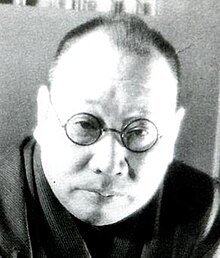Mantarō Kubota
Mantarō Kubota | |
|---|---|
 Kubota Mantarō | |
| Born | 11 November 1889 Tokyo, Japan |
| Died | 6 May 1963 (aged 73) Tokyo, Japan |
| Occupation | Writer, playwright and poet |
| Genre | novels, stage plays, haiku |
Mantarō Kubota (久保田 万太郎, Kubota Mantarō, 11 November 1889 – 6 May 1963) was a Japanese author, playwright, and poet.
Early life
Kubota was born in the
Pre-war career
Starting from 1919, Kubota taught courses in literature at Keio University, writing stage plays in the
Kubota went on to write many full-length novels, including Tsuyushiba ("Dew on the Grass"), and Shundei ("Spring Thaw"), which depicted the joys and sorrows and traditional lifestyle of ordinary people in working-class neighborhoods in old pre-war Tokyo.
In the Great Kantō earthquake of 1923, his home in the Nippori neighborhood of Tokyo burned down, and he relocated to nearby Tabuchi, where he made the acquaintance of Ryūnosuke Akutagawa.
In 1926, along with the novelist
In 1937, together with Kunio Kishida and Toyoo Iwata, Kubota created the
In the field of haiku poetry, Kubota came to edit the haiku magazine, Shunto. Although haiku remained merely a hobby, as he was more interested in novels and plays, Kubota published several haiku collections.
Kubota was awarded the Kikuchi Kan Prize in 1942. The same year, he went to Manchukuo at the request of the Information Bureau.
Post-war career
Kubota lived in
Kubota was appointed a member of the Imperial Academy in 1947. He was subsequently a professor at Kokugakuin University. In 1951, he received the NHK Broadcasting Culture Award and became chairman of the Japan Theatre Arts Association the same year. The following year, he became chairman of the Japan Writers' Association and was made a member of UNESCO in Japan. In 1954, he accepted the post of professor at Kyoritsu Women's University. In 1956, Kubota received the Yomiuri Prize for his work San no Tori. In 1957, Kubota was awarded the Order of Culture and was also appointed a Person of Cultural Merit.
Kubota died on 6 May 1963 at the age of 73, of
See also
References
- Powell, Brian. Japan's Modern Theatre: A Century of Change and Continuity. RoutledgeCurzon (2002). ISBN 1-873410-30-1
